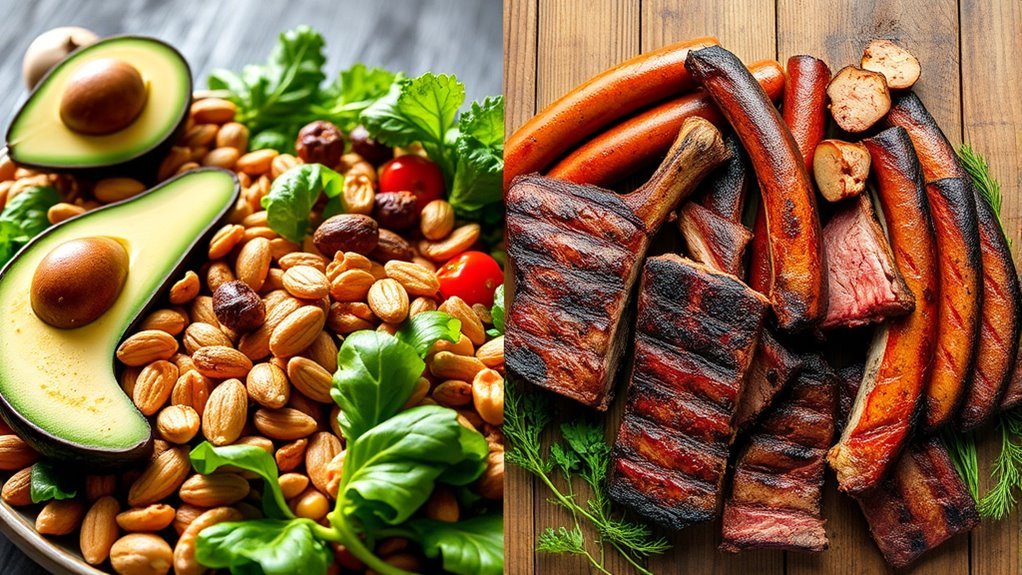Both the ketogenic and carnivore diets can support weight loss, but their effectiveness depends on your personal preferences and health goals. The keto diet emphasizes high fats and low carbs, promoting fat burning and energy stability. In contrast, the carnivore diet focuses solely on animal products, potentially improving metabolic health. However, it may lead to nutrient deficiencies. Understanding the benefits and drawbacks of each can help you make an informed choice that aligns with your lifestyle. More insights await!
Understanding the Ketogenic Diet

When you’re exploring weight loss options, understanding the ketogenic diet is essential since it can considerably impact your approach. The keto diet emphasizes a specific keto macronutrient balance, typically consisting of high fats, moderate proteins, and very low carbohydrates. This unique balance helps your body enter a state of ketosis, where it burns fat for fuel instead of carbs. To achieve ketosis, you can employ various ketosis induction methods, like drastically reducing your carb intake or fasting intermittently. By embracing this diet, you can experience weight loss while enjoying a variety of tasty foods. However, it’s vital to listen to your body and find a balance that works for you, ensuring you maintain your freedom in food choices while pursuing your weight loss goals.
The Science Behind the Carnivore Diet

Although the carnivore diet might seem extreme, it’s rooted in the idea that human beings can thrive on an all-animal food regimen. Advocates argue that meat-based nutrition can promote ideal carnivore health by providing essential nutrients without the burden of plant toxins. Research suggests that eliminating carbohydrates may improve metabolic health and reduce inflammation.
| Nutrient | Source | Benefit |
|---|---|---|
| Protein | Red meat | Muscle repair and growth |
| Fat | Fish | Energy and hormone production |
| Vitamins (B12) | Organ meats | Nerve function and energy |
Key Differences Between Keto and Carnivore

While both the keto and carnivore diets aim to promote weight loss through low carbohydrate intake, they differ markedly in their food sources and overall nutritional philosophy. Here are key differences to contemplate:
- Food Variety: Keto allows for a range of foods, including nuts, dairy, and low-carb veggies, while carnivore focuses solely on animal products.
- Nutritional Balance: Keto emphasizes macronutrient ratios, whereas carnivore centers on protein and fat, often leading to misconceptions about nutrient deficiencies.
- Flexibility: Keto offers more flexibility in meal planning, combating common keto misconceptions about strictness.
- Health Considerations: Carnivore myths suggest it’s universally beneficial, but it may not suit everyone.
Understanding these distinctions helps you make informed choices tailored to your lifestyle and goals.
Health Benefits of the Ketogenic Diet
The ketogenic diet offers several health benefits that can enhance your overall well-being. Many people experience improved fat burning, as the diet shifts your body into a state of ketosis, which efficiently uses fat for energy. Additionally, enhanced mental clarity is often reported, making it easier to focus and think clearly throughout the day.
Improved Fat Burning
When you embrace the ketogenic diet, your body undergoes a remarkable shift in its primary energy source, changing from carbohydrates to fats. This change enhances fat oxidation, allowing your body to tap into its fat reserves more efficiently. As you gain metabolic flexibility, you’ll experience several benefits:
- Increased energy levels from burning fat.
- Reduced hunger due to stabilized blood sugar.
- Enhanced endurance during physical activities.
- Improved body composition as you shed excess weight.
Enhanced Mental Clarity
As your body adapts to burning fat for fuel, you may also notice improvements in mental clarity. Many individuals on a ketogenic diet report enhanced cognitive performance and heightened mental focus. This shift occurs because ketones, produced during fat metabolism, serve as a more efficient energy source for your brain compared to glucose. Research indicates that ketogenic diets can reduce brain fog and improve overall cognitive function. Additionally, some studies suggest that these diets may protect against neurodegenerative diseases. While everyone’s experience can differ, many find that increased mental clarity allows for better decision-making and creativity. Embracing the ketogenic lifestyle could lead to not only physical benefits but also significant improvements in how you think and feel daily.
Advantages of the Carnivore Diet
When considering the carnivore diet, one key advantage is its simplicity; you only need to focus on animal-based foods. This streamlined approach can make meal planning easier and may contribute to increased satiety, helping you feel fuller for longer. As you explore these benefits, you’ll find they can play a significant role in your weight loss journey.
Simplicity of Food Choices
Many people find the simplicity of food choices in the carnivore diet appealing. With a limited selection, you can easily streamline your meal prep, reducing time and stress in the kitchen. Unlike diets that require extensive food variety, the carnivore approach focuses solely on animal products, making grocery shopping straightforward. Here are some benefits of this simplicity:
- Fewer decisions: You know exactly what to eat.
- Quick meal prep: Cooking is often as simple as grilling or roasting.
- Less temptation: With fewer options, you’re less likely to stray.
- Consistent nutrition: You get a steady intake of essential nutrients.
This freedom from complex choices can create a more relaxed relationship with food, enhancing your weight loss journey.
Increased Satiety Levels
The simplicity of food choices in the carnivore diet not only makes meal prep easy but also contributes to increased satiety levels. By focusing solely on animal products, you’re consuming nutrient-dense foods that promote hormonal balance. Proteins and fats are known to enhance appetite regulation, helping you feel fuller for longer periods. Studies suggest that diets high in protein can boost levels of hormones like peptide YY, which signals fullness. This means you’re less likely to experience cravings or overeat, allowing for greater freedom in your eating habits. With fewer options, you can enjoy meals without the stress of decision-making, leading to a more satisfying and sustainable approach to weight loss. Embracing the carnivore diet could help you achieve your goals while feeling content.
Potential Drawbacks of the Keto Diet
Although the ketogenic diet has gained popularity for its potential weight loss benefits, it’s important to evaluate its potential drawbacks. Many who start the diet experience symptoms commonly referred to as the “keto flu,” which can include:
- Fatigue and lethargy
- Headaches and dizziness
- Nausea and digestive issues
- Intense carb cravings
These symptoms can be discouraging, especially when you’re trying to adapt to a low-carb lifestyle. Additionally, the restrictive nature of the keto diet may lead to feelings of deprivation or social isolation, making it harder to stick with long-term. It’s essential to weigh these potential challenges against the benefits, ensuring you choose an approach that aligns with your lifestyle and goals for freedom in your eating habits.
Risks and Limitations of the Carnivore Diet
While the carnivore diet may promise quick weight loss, it comes with significant risks and limitations you should consider. You might face nutrient deficiencies due to the lack of plant-based foods, which can impact your overall health. Additionally, issues like digestive discomfort and concerns about the diet’s long-term sustainability and cost could affect your ability to stick with it.
Nutrient Deficiencies Concern
As you reflect on the carnivore diet for weight loss, it’s essential to be aware of the potential for nutrient deficiencies that can arise from such a restrictive eating plan. This diet often lacks necessary dietary balance, impacting your overall health. Here are some common nutrient deficiencies you might encounter:
- Vitamin C: Essential for immune function, typically found in fruits and vegetables.
- Fiber: Important for digestive health, mostly sourced from plant-based foods.
- Magnesium: Critical for muscle and nerve function, often obtained from nuts and seeds.
- Folate: Fundamental for DNA synthesis, primarily found in leafy greens.
Relying solely on animal products limits your nutrient sources, making it important to reflect on these deficiencies before fully committing to the carnivore diet.
Digestive Health Issues
When you adopt the carnivore diet for weight loss, you might overlook potential digestive health issues that can arise from such a limited intake of food types. This diet primarily consists of animal products, which can disrupt your gut microbiome balance. A diverse diet supports various beneficial bacteria, important for digestion and overall health. Without fiber-rich foods, you may experience reduced digestive enzyme production, leading to discomfort and constipation. Additionally, a lack of variety can impair nutrient absorption, further complicating digestive health. While the carnivore diet might offer short-term weight loss, it’s essential to evaluate these potential risks. Maintaining gut health is important for long-term wellness, so weighing the pros and cons before fully committing is significant.
Sustainability and Cost
The carnivore diet’s focus on animal products raises important questions about its sustainability and cost-effectiveness. While you might enjoy the simplicity, consider these factors in your meal planning:
- High Cost: Premium cuts of meat can strain your budget compared to a mixed diet.
- Environmental Impact: Intensive animal farming poses risks to ecosystems and biodiversity.
- Limited Variety: A restrictive diet may lead to nutrient deficiencies, prompting more supplementation costs.
- Long-Term Viability: Adapting to a solely animal-based diet can be challenging, impacting your adherence and overall success.
In a cost comparison with other diets, the carnivore approach often falls short regarding long-term sustainability and affordability. Balancing your food choices can lead to better health without breaking the bank.
Personalization: Choosing the Right Diet for You
Choosing the right diet for weight loss isn’t a one-size-fits-all approach; it requires careful consideration of your personal preferences, lifestyle, and health goals. Both keto and carnivore diets can yield results, but they may not suit everyone. Think about your individual preferences and dietary restrictions. If you have food tolerances or a personal history of certain conditions, that’ll influence your choice considerably. Lifestyle factors, like how much time you have for meal prep and dining out, also matter. Finally, align your health goals with the diet you choose. Whether you value variety or simplicity, finding a plan that feels right for you is essential for long-term success and freedom in your weight loss journey.
Comparing Long-Term Sustainability
Long-term sustainability of a diet is a key factor in achieving lasting weight loss results. When comparing Keto and Carnivore, evaluate these aspects:
- Diet Adherence: How easily can you stick to the plan?
- Lifestyle Compatibility: Does it mesh with your daily routine?
- Social Implications: Can you enjoy meals with others without feeling restricted?
- Food Variety: Are you okay with the limited options in a Carnivore diet versus Keto’s broader range?
Both diets have psychological factors to weigh; personal preferences play a significant role in meal prep. Remember, a sustainable diet should promote long-term results without compromising your freedom to enjoy food and life. Choose what suits your lifestyle best for greater success.
Real-Life Success Stories and Testimonials
While many people share their weight loss journeys, the experiences of those who have embraced the Keto or Carnivore diets can offer valuable insights. You’ll find inspiring real-life transformations that highlight the effectiveness of these diets. Personal testimonials reveal how individuals have shed significant pounds, improved energy levels, and gained mental clarity. Many report that embracing these low-carb lifestyles allowed them to break free from unhealthy eating habits and regain control over their bodies. Some prefer the structure of Keto, while others thrive on the simplicity of Carnivore. Ultimately, both diets can lead to impressive results, but your success will depend on your lifestyle preferences and goals. Exploring these stories can provide the motivation you need to start on your own journey.
What is the primary difference between the Keto and Carnivore diets?
The primary difference between the Keto and Carnivore diets lies in their macronutrient composition. The Keto diet emphasizes a high-fat, moderate-protein, and low-carbohydrate intake, typically consisting of around 70-75% fat, 20-25% protein, and 5-10% carbohydrates. In contrast, the Carnivore diet is an all-animal product diet that consists solely of meat, fish, and animal-derived products, effectively eliminating carbohydrates altogether. While both diets aim to induce ketosis—a metabolic state where the body burns fat for fuel—Keto allows for a broader variety of foods, including low-carb vegetables and dairy, whereas Carnivore is more restrictive.
Which diet is more effective for weight loss: Keto or Carnivore?
Both the Keto and Carnivore diets can be effective for weight loss, but individual results may vary. The Keto diet often leads to weight loss due to its low carbohydrate intake, which can reduce insulin levels and promote fat burning. Many people experience rapid weight loss initially due to water weight loss and glycogen depletion. On the other hand, the Carnivore diet may also promote weight loss by eliminating an entire food group, which could lead to a natural reduction in calorie intake. Ultimately, the effectiveness of either diet will depend on personal preferences, adherence, and overall lifestyle.
Are there any health risks associated with the Keto or Carnivore diets?
Both Keto and Carnivore diets can pose potential health risks, particularly if not followed carefully. The Keto diet may lead to nutrient deficiencies if not balanced properly, as it excludes many fruits, vegetables, and whole grains. Common side effects can include the “Keto flu,” characterized by fatigue, headaches, and irritability during the initial adaptation phase. The Carnivore diet, being highly restrictive, may lead to deficiencies in vitamins and minerals found in plant foods, along with concerns regarding heart health due to high saturated fat intake. It’s essential to consult with a healthcare provider before starting either diet, especially if you have underlying health conditions.
Can I maintain a healthy lifestyle while following a Keto or Carnivore diet?
Maintaining a healthy lifestyle on either the Keto or Carnivore diet is possible, but it requires careful planning and consideration. On the Keto diet, it’s important to include a variety of healthy fats, lean proteins, and low-carb vegetables to ensure adequate nutrient intake. Supplements may also be necessary to prevent deficiencies. For the Carnivore diet, prioritizing a variety of animal products (including organ meats) can help mitigate some nutritional gaps. Regardless of the chosen diet, regular check-ins with healthcare professionals and monitoring your health markers are crucial for long-term sustainability.
Which diet is easier to stick to for long-term weight loss?
The ease of sticking to the Keto or Carnivore diet for long-term weight loss largely depends on individual preferences and lifestyle. Some individuals find the Keto diet more sustainable due to its flexibility, allowing for a wider range of food choices and the inclusion of low-carb vegetables and dairy. Others may prefer the Carnivore diet for its simplicity and straightforward approach, requiring no counting of macros or calories. Ultimately, the best diet for long-term weight loss is one that fits your personal preferences and lifestyle, enabling you to maintain consistency and adherence over time.
References
- https://www.ncbi.nlm.nih.gov/pmc/articles/PMC8418448/
- https://www.health.harvard.edu/staying-healthy/the-keto-diet
- https://www.mayoclinic.org/healthy-lifestyle/nutrition-and-healthy-eating/expert-answers/keto-diet/faq-20451323
- https://www.cdc.gov/healthyweight/healthy_eating/index.html
- https://www.ncbi.nlm.nih.gov/pmc/articles/PMC7698717/
- https://www.nutrition.org.uk/healthyliving/healthyeating/keto-diet.html
- https://www.who.int/news-room/fact-sheets/detail/healthy-diet


